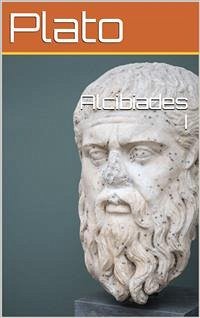The First Alcibiades or Alcibiades I is a dialogue featuring Alcibiades in conversation with Socrates. It is ascribed to Plato, although scholars are divided on the question of its authenticity.
In the preface Alcibiades is described as an ambitious young man who is eager to enter public life. He is extremely proud of his good looks, noble birth, many friends, possessions and his connection to Pericles, the leader of the Athenian state. Alcibiades has many admirers but they have all run away, afraid of his coldness. Socrates was the first of his admirers but he has not spoken to him for many years. Now the older man tries to help the youth with his questions before Alcibiades presents himself in front of the Athenian assembly. For the rest of the dialogue Socrates explains the many reasons why Alcibiades needs him. By the end of Alcibiades I, the youth is much persuaded by Socrates' reasoning, and accepts him as his mentor.
The first topic they enter is the essence of politics – war and peace. Socrates claims that people should fight on just grounds, but he doubts that Alcibiades has any knowledge about justice. Prodded by Socrates’ questioning, Alcibiades admits that he has never learned the nature of justice from a master nor has discovered it by himself.
Alcibiades suggests that politics is not about justice but expediency and the two principles could be opposed. Socrates persuades him that he is mistaken, and there is no expediency without justice. The humiliated youth concedes that he knows nothing about politics.
Later Alcibiades says that he is not concerned about his ignorance because all the other Athenian politicians are ignorant. Socrates reminds him that his true rivals are the kings of Sparta and Persia. He delivers a long lecture about the careful education, glorious might and unparalleled richness of these foreign rulers. Alcibiades gets cold feet which was exactly the purpose of Socrates’ speech.
In the last sentence Socrates expresses his hope that Alcibiades will persist, but he has fears because the power of the state "may be too much" for both of them.
In the preface Alcibiades is described as an ambitious young man who is eager to enter public life. He is extremely proud of his good looks, noble birth, many friends, possessions and his connection to Pericles, the leader of the Athenian state. Alcibiades has many admirers but they have all run away, afraid of his coldness. Socrates was the first of his admirers but he has not spoken to him for many years. Now the older man tries to help the youth with his questions before Alcibiades presents himself in front of the Athenian assembly. For the rest of the dialogue Socrates explains the many reasons why Alcibiades needs him. By the end of Alcibiades I, the youth is much persuaded by Socrates' reasoning, and accepts him as his mentor.
The first topic they enter is the essence of politics – war and peace. Socrates claims that people should fight on just grounds, but he doubts that Alcibiades has any knowledge about justice. Prodded by Socrates’ questioning, Alcibiades admits that he has never learned the nature of justice from a master nor has discovered it by himself.
Alcibiades suggests that politics is not about justice but expediency and the two principles could be opposed. Socrates persuades him that he is mistaken, and there is no expediency without justice. The humiliated youth concedes that he knows nothing about politics.
Later Alcibiades says that he is not concerned about his ignorance because all the other Athenian politicians are ignorant. Socrates reminds him that his true rivals are the kings of Sparta and Persia. He delivers a long lecture about the careful education, glorious might and unparalleled richness of these foreign rulers. Alcibiades gets cold feet which was exactly the purpose of Socrates’ speech.
In the last sentence Socrates expresses his hope that Alcibiades will persist, but he has fears because the power of the state "may be too much" for both of them.









